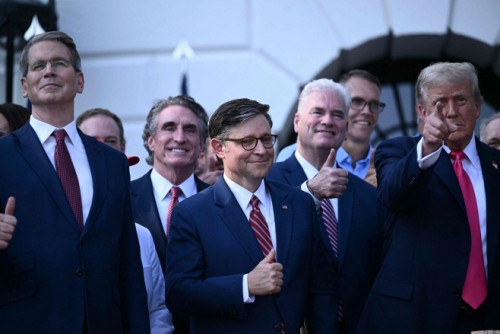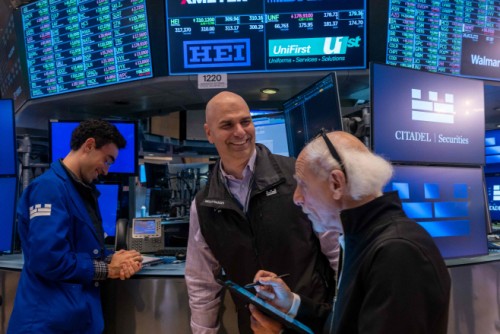 |
| U.S. President Donald Trump (right), House Speaker Mike Johnson (center), and Treasury Secretary Scott Bessent (left) pose after the signing ceremony for the “One Big Beautiful Bill” at the White House on July 4. / AFP-Yonhap |
The U.S. economy continues to stand out for its resilience compared to other advanced nations, a trend that analysts attribute to President Donald Trump’s second-term economic program—dubbed “Trumponomics.” Built on two pillars, aggressive tax cuts and sweeping deregulation, the policy mix is driving strong growth and investor optimism even as concerns mount over ballooning federal debt.
According to the Commerce Department, U.S. gross domestic product (GDP) grew at an annualized rate of 3.3% in the second quarter, outpacing market forecasts of 3.1%. The International Monetary Fund (IMF) recently raised its full-year U.S. growth outlook to 1.9%, well above the advanced economy average of 1.5%.
At the heart of the growth momentum is the “One Big Beautiful Bill” (OBBBA), signed into law by Trump on July 4. The legislation makes the 2017 tax cuts permanent, locking in the corporate tax rate at 21% while reducing the top marginal income tax rate. Over the next decade, the package is expected to deliver $4.5 trillion in tax relief.
The law also allows companies to immediately expense capital investment and research and development (R&D) costs, spurring corporate spending. Analysts estimate that 369 firms in the S&P 500 index will collectively gain about $148 billion in tax benefits.
Defense modernization and expanded security budgets have further fueled growth, creating lucrative contracts for startups in fields such as artificial intelligence and satellite technology.
Tax relief is working hand in hand with deregulation. On his first day back in office, Trump signed an executive order mandating the repeal of 10 existing regulations for every new one introduced. Since then, rules have been rolled back across sectors including energy, environment, finance, and cryptocurrency.
This deregulatory push has created fertile ground for innovation and new business models, while also positioning the U.S. as an attractive destination for companies seeking alternatives to markets where regulatory burdens and high tariffs are mounting—such as South Korea.
Investors have responded with enthusiasm, propelling Wall Street to record highs. On August 22, traders at the New York Stock Exchange cheered as major indices climbed following Federal Reserve Chair Jerome Powell’s speech in Jackson Hole.
Still, the Congressional Budget Office (CBO) has warned that the tax cuts could add more than $2.4 trillion to the federal debt, raising questions about long-term fiscal stability. For now, however, markets remain focused on the short-term surge in growth and confidence that Trumponomics has generated.
 |
| Traders smile on the floor of the New York Stock Exchange on August 22 as major indexes surged. / AFP-Yonhap |
Most Read
-
1
-
2
-
3
-
4
-
5
-
6
-
7





















